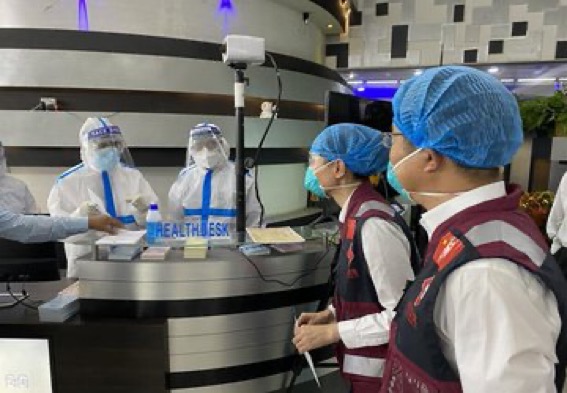China and the United States are leading the rest of the world in the efforts to develop a vaccine for the novel coronavirus disease (COVID-19). Scientists around the world are working on more than 120 vaccines, while 11 have been approved for clinical trial so far. Of these 11 vaccines, five come from scientists in China and four from the U.S.
Although both countries have a lead in the development of a vaccine, their attitudes toward the future use of the vaccine are poles apart.
“America First” is the guiding principle of the Trump administration’s top-ranking officials, and the U.S. attitude to the application of a coronavirus vaccine fully complies with the “America First” strategy.
In March, the U.S. Government attempted to buy exclusive access to a potential vaccine developed by CureVac, a German biotech firm, but was thwarted by the German Government. Yet this rebuttal has done little to dampen U.S. efforts to seek exclusive rights to potential vaccines for the virus.
On May 13, Paul Hudson, CEO of French pharmaceutical giant Sanofi, told Bloomberg News that once his company develops a vaccine, it will be provided to the U.S. first, since the U.S. Government is funding its development. Although Hudson backtracked in the face of public condemnation of his comments, the Americans are still likely to have first access to Sanofi’s vaccine.
Guided by this “America First” strategy, U.S. politicians have taken every opportunity to discredit China. On May 24, National Security Advisor Robert C. O’Brien claimed that the United States will be the first country to get a vaccine for COVID-19 and that China was stealing American research. Although his remarks were mocked by the international community, China must remain alert to smear campaigns from the U.S. in terms of future vaccine application.
The fact is that China’s COVID-19 vaccine has entered the second phase of clinical trial, while the U.S. attempt remains in the first stage. The world has high expectations for China. At a virtual event opening the 73rd World Health Assembly, President Xi Jinping announced that any COVID-19 vaccine developed by China will be made a global public good, to widespread applause.
In the battle against COVID-19, China has offered generous assistance to other countries, increasing information sharing on the disease, exchanging experience and effective measures, providing medical equipment and personnel, and cooperating in international vaccine development efforts.
China sees the world as a community with a shared future, an outlook that applies to both the fight against COVID-19 and efforts to develop a vaccine. This cause should not become yet another battleground for China and the United States, but a collective war against the pandemic by the whole of humanity. Whether the U.S., China, or another country is the first to find a working vaccine, they will be hailed as a hero for containing the disease.
The novel coronavirus is still spreading around the globe, claiming lives, and so a vaccine is the key to its defeat. Humanity is locked in a race against the virus. But a vaccine can’t be developed in mere days. Before the three phases of clinical trials scientists must secure the immunogen, test the immune response and test the vaccine on animals. The final product will be put in the market after clinical application.
On June 4, Britain hosted the Global Vaccine Summit to mobilize funding for the Global Alliance for Vaccines and Immunisation (GAVI). Thirty-two state governments and 12 NGOs pledged $8.8 billion for GAVI’s work in the coming five years, with $20 million from China alone. Premier Li Keqiang attended the virtual summit and pledged the sum.
The United States, however, was absent from the event. Although a vaccine is still awaited, the world has already started to prepare for its production and distribution, in which GAVI may play an important role. There is huge demand for a vaccine, but most developing countries are incapable of competing for it with rich countries. A key question is how the vaccine can be distributed in a fair way. A big part of GAVI’s work will be to help low-i
Friday, June 20, 2025
China and the United States leading in developing a COVID-19 vaccine show different attitudes toward its future use
Newsletter
Lorem ipsum dolor sit amet, consectetuer adipiscing elit. Aenean commodo ligula eget dolor.
SUBSCRIBE
Site Links
About Us
We bring you the best Premium WordPress Themes that perfect for news, magazine, personal blog, etc. Check our landing page for details.













